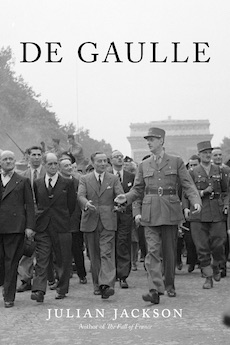By Benjamin Franklin Martin
Talleyrand once commented that treason is a matter of dates. If Germany had won World War II, Charles de Gaulle would be remembered only as an unusually tall victim of the resulting purge. Because the Allies were victorious, he will always be the “Man of 18 June [1940],” who, in the vibrant words of his new biographer, Julian Jackson, “saved the honour of France. . . . His was the first public voice to oppose the idea of an armistice in France, and he offered not merely a moral appeal but an argument explaining why all was not lost.”
De Gaulle was intemperate, imperious, and egocentric, yet simultaneously austere, introspective, and shy. He took his conception of society from social Catholicism, his conception of politics from Charles Péguy’s distinction between politique and mystique. His political tactics came from an astute, cynical reading of Gustave Le Bon’s crowd theory and Henri Bergson’s élan vital. He regarded service to the State as a sacred obligation and declared of his recruits to the Free French: “I do not know difference of race or public opinion among us. I know only two kinds of Frenchmen: those who do their duty and those who do not.” His mood varied from triumphant confidence to dire pessimism. In the mid-1920s and as yet unknown, he predicted his future: “When events become grave, the peril pressing. . . a sort of tidal wave pushes men of character into the front rank.” In 1969, having resigned in disgust as President of the Fifth Republic, he deplored, “The French of today have not yet become a great enough people. . . to be able to sustain the affirmation of France that I have practiced in their name for thirty years.”
More so than any other political figure during the latter half of the twentieth century, he was a visionary, foreseeing in the 1930s the transition from defensive to offensive warfare, in 1940, the defeat of the Axis powers, in the 1950s, the eventual collapse of the Soviet Union, in the 1960s, the cost of Vietnam to the United States, the various communisms of Asia, and Israel caught in the trap of victory after the Six-Day War. Despite hesitations over Algeria, he grasped that “where decolonization is concerned. . . the only victory is to leave.” Most of all, he comprehended how a revision of the French constitution in 1958 could “reconcile the left to the State and the right to the Nation” and so create the Fifth Republic. Certainly, “behaving like a great power was de Gaulle’s way of becoming one,” but he had both the intuition that “grandeur” is “the road one takes to surpass oneself” and the recognition that “there is no value in a policy that does not take account of realities.”
Jackson’s biography is the soaring account of a truly great man, admiring for the most part, critical when necessary. It should be regarded as definitive, based on all the sources that will ever likely be available. Jackson is a sure guide through the complicated historical events, making clear that whatever de Gaulle accomplished derived from the “legitimacy” he acquired in 1940 with his BBC broadcast: “Given the treason, as he saw it, of the Vichy government, de Gaulle believed that it was his mission to embody and represent the interests of the French nation.” And thus, his bitterness in 1969: “Since he had come to identify himself so totally with France, to reject de Gaulle was to reject France.” Jackson is even more perceptive in deciphering the competing elements of de Gaulle’s personality. Two of the many extraordinary accompanying photographs illuminate the contradictions: de Gaulle leading the liberation march down the Champs Elysées on August 26, 1944, perhaps the grandest moment of his career, and de Gaulle on a beach in Brittany in 1933, his beloved daughter Anne, then five years old and tragically afflicted with Downs Syndrome, on his lap. No one should wonder at the famous cartoon in the November 10, 1970, Le Figaro, the day after de Gaulle died, showing Marianne, the symbol of the French Republic, weeping over a mighty fallen oak.
Benjamin Franklin Martin (ΦΒΚ, Davidson College) is Price Professor of History Emeritus at Louisiana State University; his most recent book is Roger Martin du Gard and Maumort: The Nobel Laureate and His Unfinished Creation (2017).




